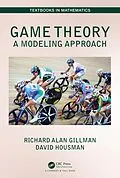Game Theory: A Modeling Approach quickly moves readers through the fundamental ideas of the subject to enable them to engage in creative modeling projects based on game theoretic concepts.
The authors match conclusions to real-world scenarios and applications. The text engages students in active learning, group work, in-class discussions and interactive simulations.
Each chapter provides foundation pieces or adds more features to help readers build game theoretic models. The chapters include definitions, concepts and illustrative examples. The text will engage and challenge both undergraduate and graduate students.
Features:
- Enables readers to apply game theorty to real-world scenarios
- Chapters can be used for core course materials or independent stuides
- Exercises, included at the end of the chapters, follow the order of the sections in the text
- Select answers and solutions are found at the end of the book
- Solutions manual for instructors is available from the authors
Autorentext
Richard Alan Gillman is a mathematics professor at Valparaiso University.
David Housman teaches courses in applied mathematics and computer science at Goshen College.
Klappentext
This is an introductory game theory book that quickly moves readers through the fundamental ideas of game theory to enable them to engage in creative modeling projects based on game theoretic concepts. The book is linear, as the chapters are not independent. Readers should be able to build simple game theoretic models after chapter 3. Each subsequent chapter adds another feature to the reader's model-building repertoire.
Inhalt
- Models and Games
- Player Preferences
- Simultaneous Play
- Bilateral Agreements
- Sequential Play
- Missing Information
- Repetitious Play
- Multilateral Agreements
- Resource Allocation
INTRODUCTION TO MODELING
INTRODUCTION TO GAME THEORY
EXAMPLES OF GAMES
RATIONALITY ASSUMPTION
ORDINAL UTILITIES
VON NEUMANNMORGENSTERN
UTILITIES
CONSTRUCTING UTILITIES
DETERMINING RISK
STRATEGIC GAMES
FINAL JEOPARDY
MIXED STRATEGIES
NONMATRIX
MODELS
LIMITATIONS
NEGOTIATIONS
BARGAINING IN STRATEGIC GAMES
FAIRNESS PROPERTIES
SEQUENTIAL GAMES
SUBGAME PERFECT EQUILIBRIA
COMBINATORIAL GAMES
MORAL HAZARD
IMPERFECT INFORMATION
ROMANS AND GERMANS
INCOMPLETE INFORMATION
BARGAINING GAMES WITH PRIVATE INFORMATION
INTERNATIONAL COLLABORATION
AUCTIONS
REPEATED SOCIAL DILEMMAS
MODELING NOISE
EVOLUTIONARY GAME THEORY
SHAPLEY ARGUMENT
NUCLEOLUS ARGUMENT
BARGAINING ARGUMENT
VOTING POWER
RESOURCE ALLOCATION PROBLEM
BARGAINING AND COALITION MODELS
COMPLETE AND INCOMPLETE INFORMATION MODELS
CONCLUDING REMARKS
